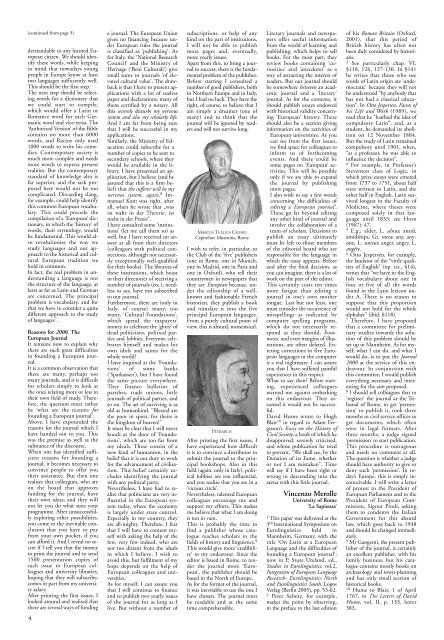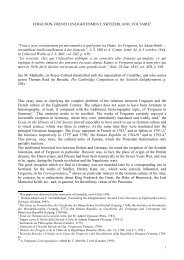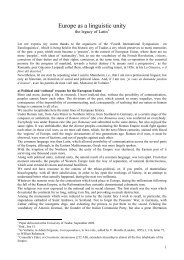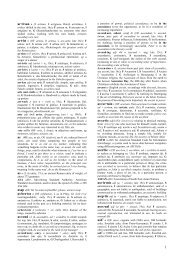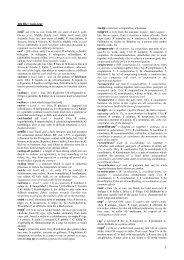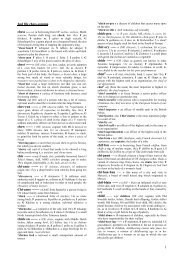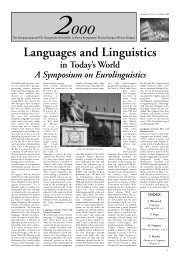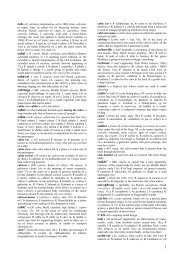Merolle imp 2-05v5 - vincenzo merolle
Merolle imp 2-05v5 - vincenzo merolle
Merolle imp 2-05v5 - vincenzo merolle
You also want an ePaper? Increase the reach of your titles
YUMPU automatically turns print PDFs into web optimized ePapers that Google loves.
(continued from page 3)<br />
derstandable to any learned European<br />
citizen. We should identify<br />
these words, while keeping<br />
in mind that nowadays young<br />
people in Europe know at least<br />
two languages sufficiently well.<br />
This should be the first step.<br />
The next step should be selecting<br />
words for a dictionary that<br />
we could start to compile,<br />
which would offer a Latin or<br />
Romance word for each Germanic<br />
word and vice-versa. The<br />
‘Authorised Version’ of the Bible<br />
contains no more than 6000<br />
words, and Racine only used<br />
1000 words to write his comedies.<br />
Contemporary society is<br />
much more complex and needs<br />
more words to express present<br />
realities. But the contemporary<br />
standard of knowledge also is<br />
far superior, and the task proposed<br />
here would not be too<br />
complicated. Discarding slang,<br />
for example, could help identify<br />
this common European vocabulary.<br />
This could precede the<br />
compilation of a ‘European’ dictionary,<br />
in which the ‘history’ of<br />
words, their etymology, would<br />
be fundamental. This would also<br />
revolutionise the way we<br />
study languages and our approach<br />
to the historical and cultural<br />
European tradition we<br />
hold in common.<br />
In fact, the real problem in understanding<br />
a language is not<br />
the structure of the language, at<br />
least as far as Latin and German<br />
are concerned. The principal<br />
problem is vocabulary, and for<br />
that we have to consider a quite<br />
different approach to the study<br />
of languages 7 .<br />
Reasons for 2000. The<br />
European Journal<br />
It remains now to explain why<br />
there are such great difficulties<br />
in founding a European journal.<br />
It is a common observation that<br />
there are many, perhaps too<br />
many journals, and it is difficult<br />
for scholars s<strong>imp</strong>ly to look at<br />
the ones relating more or less to<br />
their own field of study. Therefore,<br />
the question must rather<br />
be ‘what are the reasons for<br />
founding a European journal’.<br />
Above, I have expounded the<br />
reasons for the journal which I<br />
have handed out to you. This<br />
was the premise as well as the<br />
substance of the discourse.<br />
When one has identified sufficient<br />
reasons for founding a<br />
journal, it becomes necessary to<br />
convince people to offer you<br />
their assistance. But then one<br />
realises that colleagues, who are<br />
on the board that approves<br />
funding for the journal, have<br />
their own ideas, and they will<br />
not let you do what suits your<br />
programme. After unsuccessfully<br />
exploring other possibilities,<br />
you come to the inevitable conclusion<br />
that you have to pay<br />
from your own pocket, if you<br />
can afford it. And I reveal no secret<br />
if I tell you that the money<br />
to print the journal and to send<br />
1500 presentation copies of<br />
each issue to European colleagues<br />
and university libraries,<br />
hoping that they will subscribe,<br />
comes in part from my university<br />
salary.<br />
After printing the first issues, I<br />
looked around and realised that<br />
there are several ways of funding<br />
a journal. The European Union<br />
gives no financing because under<br />
European rules the journal<br />
is classified as ‘publishing’. As<br />
for Italy, the ‘National Research<br />
Council’ and the Ministry of<br />
Heritage (‘Beni Culturali’) give<br />
small sums to journals ‘of elevated<br />
cultural value’. The drawback<br />
is that I have to present applications<br />
with a lot of useless<br />
paper and declarations, many of<br />
them certified by a notary. All<br />
this severely disturbs my nervous<br />
system and also my scholarly life.<br />
And I am far from being sure<br />
that I will be successful in my<br />
applications.<br />
Similarly, the Ministry of Education<br />
could subscribe for a<br />
number of copies to be sent to<br />
secondary schools, where they<br />
would be available in the library.<br />
I have presented an application,<br />
but I believe (and be<br />
assured that this is a firm belief)<br />
that the sufferer will be my<br />
nervous system, again. 8 Immanuel<br />
Kant was right, after<br />
all, when he wrote that „was<br />
ist wahr in der Theorie, ist<br />
nicht in der Praxis“.<br />
I have consulted some ‘institutions’<br />
(let me call them so) as<br />
well, but I have received no answer<br />
at all from their directors<br />
(colleagues with political connections,<br />
although not necessarily<br />
exceptionally well-qualified<br />
for their books). The libraries of<br />
these institutions, which boast<br />
in their directories of receiving a<br />
number of journals (etc.), needless<br />
to say, have not subscribed<br />
to our journal.<br />
Furthermore, there are (only in<br />
Italy, of course) many, too<br />
many, ‘Cultural Foundations’,<br />
which spend the taxpayers’<br />
money to celebrate the ‘glory’ of<br />
dead politicians, political parties<br />
and lobbies. Everyone celebrates<br />
himself and makes his<br />
own idols and saints for the<br />
whole world!<br />
I have inquired at the ‘Foundations’<br />
of some banks<br />
(‘Sparkassen’), but I have found<br />
the same picture everywhere.<br />
They finance bulletins of<br />
parishes, trade unions, little<br />
journals of political parties, and<br />
so on. The art of surviving is as<br />
old as humankind. “Blessed are<br />
the poor in spirit, for theirs is<br />
the kingdom of heaven!”<br />
It must be clear that I will never<br />
knock at the door of ‘Foundations’,<br />
which are too far from<br />
my ideals. These consist of a<br />
new kind of humanism, in the<br />
belief that it is our duty to work<br />
for the advancement of civilisation.<br />
This belief certainly excludes<br />
identifying the journal<br />
with any political party.<br />
Nevertheless, I have had to realise<br />
that politicians are very influential<br />
in the European system<br />
today, where the economy<br />
is largely under state control.<br />
Especially in my country, they<br />
are all-mighty. Therefore, I fear<br />
that I will have to content myself<br />
with asking the help of the<br />
few, very few indeed, who are<br />
not too distant from the ideals<br />
in which I believe. I wish to<br />
avoid this, but fulfilment of my<br />
hope depends on the help of<br />
European colleagues and universities.<br />
As for myself, I can assure you<br />
that I will continue to finance<br />
and to publish two yearly issues<br />
of the journal for as long as I<br />
live. But without a number of<br />
subscriptions, or help of any<br />
kind on the part of institutions,<br />
I will not be able to publish<br />
more pages and, eventually,<br />
more yearly issues.<br />
Apart from this, to bring a journal<br />
to success, there is the fundamental<br />
problem of the publisher.<br />
Before starting I consulted a<br />
number of good publishers, both<br />
in Northern Europe and in Italy,<br />
but I had no luck. They have the<br />
right, of course, to believe that I<br />
am s<strong>imp</strong>ly a dreamer (one of<br />
many) and to think that the<br />
journal will be ignored by readers<br />
and will not survive long.<br />
MARCUS TULLIUS CICERO<br />
Capitoline Museums, Rome<br />
I wish to refer, in particular, to<br />
the Club of the ‘five’ publishers<br />
(one in Rome, one in Munich,<br />
one in Madrid, one in Paris and<br />
one in Oxford), who tell their<br />
countrymen in newspapers that<br />
they are European because, under<br />
the editorship of a wellknown<br />
and fashionable French<br />
historian, they publish a book<br />
and translate it into the five<br />
principal European languages.<br />
From a purely cultural point of<br />
view, this is absurd, nonsensical.<br />
PETRARCH<br />
After printing the first issues, I<br />
have experienced how difficult<br />
it is to convince a distributor to<br />
submit the journal to the principal<br />
bookshops. Also in this<br />
field (again, only in Italy), political<br />
lobbies are too influential,<br />
and you realise that you are in a<br />
‘vicious circle’.<br />
Nevertheless, talented European<br />
colleagues encourage me and<br />
support my efforts. This makes<br />
me believe that what I am doing<br />
is not in vain.<br />
This is probably the time to<br />
find a publisher whose catalogue<br />
reaches scholars in the<br />
fields of history and linguistics. 9<br />
This would give more ‘credibility’<br />
to my endeavour. Since the<br />
editor is based in Rome, to render<br />
the journal more ‘European’,<br />
the publisher should be<br />
based in the North of Europe.<br />
As for the format of the journal,<br />
it was inevitable to use the one I<br />
have chosen. The journal must<br />
be readable and at the same<br />
time comprehensible.<br />
Literary journals and newspapers<br />
offer useful information<br />
from the world of learning and<br />
publishing, which helps to sell<br />
books. For the most part, they<br />
review books containing ‘curiosities’<br />
and ‘anecdotes’ as a<br />
way of attracting the interest of<br />
readers. But our journal should<br />
be somewhere between an academic<br />
journal and a ‘literary’<br />
journal. As for the contents, it<br />
should publish essays endowed<br />
with historical validity concerning<br />
‘European’ history. There<br />
should also be a section giving<br />
information on the activities of<br />
European universities. As you<br />
can see from the first issues,<br />
we find space for colleagues to<br />
inform us of forthcoming<br />
events. And there could be<br />
some pages on ‘European’ activities.<br />
This will be possible<br />
only if we are able to expand<br />
the journal by publishing<br />
more pages.<br />
I also wish to say a few words<br />
concerning ‘the difficulties of<br />
editing a European journal’.<br />
These go far beyond editing<br />
any other kind of journal and<br />
involve the collaboration of a<br />
team of scholars. Decisions to<br />
publish an essay ultimately<br />
must be left to those members<br />
of the editorial board who are<br />
responsible for the language in<br />
which the essay appears. Before<br />
and after the final decision, as<br />
you can imagine, there is a lot of<br />
work on the part of the editor.<br />
This certainly costs ten times<br />
more fatigue than editing a<br />
journal in one’s own mother<br />
tongue. Last but not least, one<br />
must consider the occurrence of<br />
misspellings as indicated by<br />
computer spelling programs,<br />
which do not necessarily respond<br />
as they should. Footnotes,<br />
and even margins of illustrations,<br />
are often deleted. Entering<br />
corrections in five European<br />
languages in the computer<br />
is a real nightmare. I can assure<br />
you that I have suffered painful<br />
experiences in this respect.<br />
What to say then? Before starting,<br />
experienced colleagues<br />
warned me against embarking<br />
on this endeavour. They assumed<br />
it would not be successful.<br />
David Hume wrote to Hugh<br />
Blair 10 in regard to Adam Ferguson’s<br />
Essay on the History of<br />
Civil Society, a book of which he<br />
disapproved, severely criticised,<br />
and whose publication he tried<br />
to prevent, “We shall see, by the<br />
Duration of its Fame, whether<br />
or not I am mistaken”. Time<br />
will say if I have been right or<br />
wrong in descending into the<br />
arena with this little journal.<br />
Vincenzo <strong>Merolle</strong><br />
University of Rome<br />
‘La Sapienza’<br />
1 This paper was delivered at the<br />
3 rd International Symposium on<br />
Eurolinguistics held in<br />
Mannheim, Germany, with the<br />
title ‘On Latin as a European<br />
Language and the difficulties of<br />
founding a European journal’;<br />
now in P. Sture Ureland, ed.,<br />
Studies in Eurolinguistics, vol.2,<br />
Integration of European Language<br />
Research- Eurolinguistics North<br />
and Eurolinguistics South, Logos<br />
Verlag (Berlin 2005), pp. 53-62.<br />
2 Peter Salway, for example,<br />
makes the point by observing,<br />
in the preface to the last edition<br />
of his Roman Britain (Oxford,<br />
2001), that this period of<br />
British history has often not<br />
been duly considered by historians.<br />
3<br />
See particularly chap. VI,<br />
§118, 126, 127-130. In §141<br />
he writes that those who use<br />
words of Latin origin are ‘undemocratic’<br />
because they will not<br />
be understood “by anybody that<br />
has not had a classical education”.<br />
In Otto Jespersen, Facets of<br />
his Life and Work (1989), we<br />
read that he “loathed the idea of<br />
compulsory Latin”, and, as a<br />
student, he demanded its abolition<br />
on 12 November 1884.<br />
But the study of Latin remained<br />
compulsory until 1901, when,<br />
“as a professor, he was able to<br />
influence the decision”.<br />
4 For example, in Professor’s<br />
Stevenson class of Logic, in<br />
which prize essays were entered<br />
from 1737 to 1751, about half<br />
were written in Latin, and the<br />
other half in English. Latin survived<br />
longest in the Faculty of<br />
Medicine, where theses were<br />
composed solely in that language<br />
until 1833: see Horn<br />
(1967): 47.<br />
5 E.g., alder, L. alnus; amid,<br />
amidships, Gr. meta; any, anyone,<br />
L. unicus; anger, angry, L.<br />
angĕre.<br />
6 Otto Jespersen, for example,<br />
the laudator of the “virile qualities<br />
of English” (op. cit., §14),<br />
writes that “we have in the English<br />
vocabulary about one in<br />
four or five of all the words<br />
found in the Latin lexicon under<br />
A. There is no reason to<br />
suppose that this proportion<br />
would not hold for the whole<br />
alphabet” (ibid. §118).<br />
7 Therefore, I have proposed<br />
that a committee for preliminary<br />
studies towards the solution<br />
of this problem should be<br />
set up in Mannheim. As for myself,<br />
what I can do, and what I<br />
would do, is to put the Journal<br />
2000 at the service of this endeavour.<br />
In conjunction with<br />
this committee, I would publish<br />
everything necessary and interesting<br />
for the aim proposed.<br />
8 I should tell colleagues that to<br />
‘register’ the journal at the Tribunal<br />
of Rome, to get ‘permission’<br />
to publish it, took three<br />
months in civil service offices to<br />
get documents, which often<br />
were in legal formats. After<br />
three months, a judge signed<br />
‘permission’ to start publication.<br />
This procedure is outrageous<br />
and needs no comment at all.<br />
The question is whether a judge<br />
should have authority to give or<br />
deny such ‘permission’. In today’s<br />
Europe, this is s<strong>imp</strong>ly inconceivable.<br />
I will write a letter<br />
of protest to the President of<br />
European Parliament and to the<br />
President of European Commission,<br />
Signor Prodi, asking<br />
them to condemn the Italian<br />
Government for this absurd<br />
law, which goes back to 1948<br />
and should be changed immediately.<br />
9 Mr Gangemi, the present publisher<br />
of the journal, is certainly<br />
an excellent publisher, with his<br />
family business, but his catalogue<br />
contains mostly books on<br />
archaeology and town-planning<br />
and has only small section of<br />
historical books.<br />
10 Hume to Blair, 1 of April<br />
1767, in The Letters of David<br />
Hume, vol. II, p. 133, letter<br />
383.<br />
4


